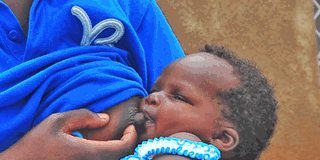Experts want government to extend maternity leave

A woman breast feeds her baby at a health centre recently. Nutritionists want government to extend maternity leave from the current three to six months. Photo by Rachel Ajwang.
What you need to know:
This, she said makes a number of mothers to resort to mixed feeding because they are not given enough time to breastfeed.
KAMPALA- Nutrition experts want government to revise maternity leave from three to six months so that mothers can exclusively breastfeed their babies for the first six months of a baby’s life.
Speaking at a media dialogue in Kampala yesterday, Dr Elizabeth Madraa, the president of Uganda Nutrition Action Plan, said many mothers are unable to breastfeed their babies because they have to juggle between work and parenthood.
This, she said makes a number of mothers to resort to mixed feeding because they are not given enough time to breastfeed.
“Government should revisit the current law and extend the days given to women for maternity leave. The current 60 days are not enough,” she said.
According to the current Uganda Labour law, new mothers are given a minimum of 60 working days of leave while the International Labour Organisation Convention, gives them 90 consecutive days.
However, this varies for women employed in the private sector with some given a maximum of four weeks, which according to Dr Madraa, denies them a right to breastfeed their babies.
“Where leave cannot be extended, women should be aided with facilities at workplaces where they can comfortably feed their babies while at the same time fulfilling their duties,” she added.
Mr Patrick Aliganyira, a technical specialist with Save the Children, said extension of maternity leave is the ideal thing to do if child survival is to be improved.
Data from the Uganda Demographic Health Survey indicates only 53 per cent of newborns are breastfed within the first hour of life, and 89 per cent within the first day.
However, only 35 per cent achieve six months exclusive breastfeeding due to lack of support from employers and absence of policies that enable women to continue breastfeeding even after they have resumed working.
According to World Health Organisation, children who receive only breast milk and no other foods or liquids, including water in the first six months of life are considered to have been exclusively breast fed.



